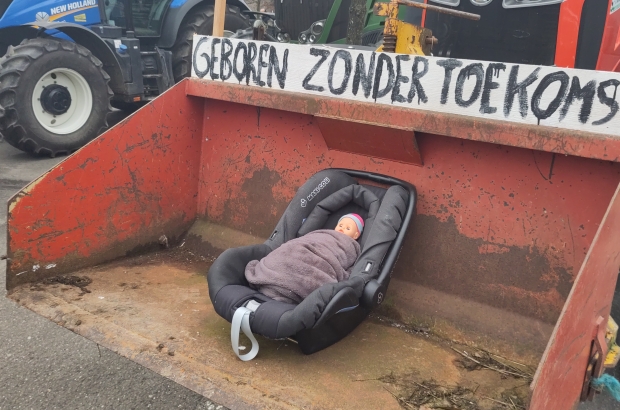- Daily & Weekly newsletters
- Buy & download The Bulletin
- Comment on our articles
Empty shelves, 'empty promises': Farmers' strike continues
Many shoppers have been met with empty shelves in grocery stores over the past few days as the farmers’ strike in Belgium continues.
Farmers have been stepping up their protest actions with blockades, tractor processions and even a visit to prime minister Alexander De Croo’s residence on Saturday evening, when they temporarily blocked off access to the home.
“The prime minister was very friendly,” a farmers' spokesperson told Het Laatste Nieuws. “He received us for an open and constructive conversation, so we are leaving satisfied, but that doesn't mean that our actions are over.”
On Saturday, distribution centres for Aldi and Delhaize were blocked, and a number of stores encountered difficulties stocking their shelves.
“The protests at the distribution centres indeed had an impact on supplies,” said a spokesperson for retail federation Comeos.
"These are gigantic stocking areas that supply hundreds of shops with products. For dry products, with long shelf lives, the impact is limited.
But fresh products are also delivered from the [blocked] centre in Zellik. Of these, some were no longer usable on the shop shelves.
"That was donated to the food bank… However, the biggest difficulties are now behind us, after constructive talks between the parties involved."
Nonetheless, further actions are expected and blockades could still occur, as farmers remain dissatisfied and mobilised.
Several hundred adults and children took part in a rally in support of farmers in Hannu (Liège province), reiterating the demand for government action.
Farmers say they are drowning in red tape and complicated legislation, while barely staying afloat with razor-thin profit margins.
De Croo put forward the idea of a solidarity mechanism to compensate farmers for price fluctuations.
“Making a profit is not a problem, but everyone should be able to make a decent profit,” De Croo said on VRT.
“Depending on the product, the profit lies either with the processor or with the distributor. It's in everyone's interest that we have agriculture that survives.”
The solidarity mechanism could take the form of insurance to which the various players in the chain would contribute.
But while Tijs Boelens, a member of the Boerenforum organisation, acknowledged that some progress had been made, he described it as too little, calling for the creation of a genuine price commission that could impose minimum prices.
Activists from the Federation of Young Farmers (FJA) – more than 1,100 of whom came to lay their problems before politicians at the start of a congress – said there ws a need for a “simpler and fairer” agricultural policy, reciprocity of standards in trade treaties and a real rethink of the quotas imposed on farmers.
FJA also reiterated that farmers were fighting for the human-scale model of agriculture that is characteristic of Wallonia and Belgium, and for a reduction in red tape.
“Your fight and your demands are ours, income and better consideration are ours,” said Walloon agriculture minister Willy Borsus (MR) in his opening remarks at the party's conference.
“This love for the profession of the land, all this is rooted in the depths of our convictions. We'll be with you all the way.”
Protest actions resulted in a number of traffic disruptions over the past week, with many blockades coming to an end over the weekend.
Protesting farmers also descended upon Brussels to make their voices heard, but Brussels Mobility believes that the material damage from the protests had been "limited".
Most of the demonstrators gathered on Place du Luxembourg and left some damage behind them, but “this remains relatively limited given the scale of the demonstration,” a spokesperson for Brussels Mobility said.
“Our teams noted the unbolting of the statue of the monument dedicated to John Cockerill, some damaged bollards and road signs, a sawn tree, as well as overturned lawns that will have to be reseeded.”
Brussels Mobility plans to lodge a complaint in order to recover the sums needed for repairs, as is often the case when such a large-scale event damages public space. The regional body said it was in the process of putting a figure on the damage.
De Croo has met several times with farming organisations and farmers and more meetings are scheduled in the wake of the most recent protest actions, particularly over the low prices farmers say they receive for their produce.
Photo: Ine Gillis/Belga


















